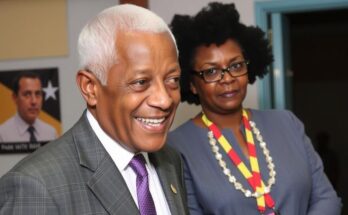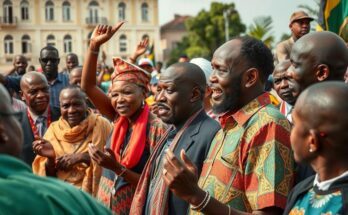In Tunisia’s first presidential election since the dismantling of its democracy, President Kais Saied has reportedly won re-election with over 89 percent of the vote. However, this victory follows the disqualification of significant opposition candidates and the imprisonment of the main rival. The dramatically reduced voter turnout highlights a growing disillusionment with Saied’s presidency, as fears rise regarding the re-emergence of authoritarianism in the birthplace of the Arab Spring.
In a significant demonstration of political authority, President Kais Saied of Tunisia has secured what appears to be a decisive re-election, as reported by various exit polls presented on state television. This election marks the first presidential contest since Mr. Saied began the systematic dismantlement of the democratic structures that emerged following the 2011 Arab Spring. Initial forecasts suggest that Mr. Saied captured an impressive 89 percent of the votes cast, prevailing against his main challenger, Ayachi Zammel—currently imprisoned on charges many observers regard as fabricated—and Zouhair Maghzaoui, a leftist candidate previously aligned with Saied’s administration. However, the election results are deeply intertwined with controversy. Notably, the Saied administration barred various significant opposition figures from participating and detained the foremost opposition leader on allegations that human rights organizations denounce as spurious. Such actions have led critics to draw parallels with the era of Zine el-Abidine Ben Ali, the former dictator who governed Tunisia from 1987 until the revolutionary uprisings in 2011. Furthermore, voter turnout for this election was reported at approximately fifty percent of the figures seen in the last presidential election, indicating a waning enthusiasm among Tunisians who once celebrated Saied’s leadership. This decline in electoral participation underscores the pervasive skepticism that has seeped into public sentiment over the current political administration, leaving many citizens feeling devoid of viable alternative leadership in the fragmented political landscape.
The political backdrop of this election is marked by the decline of democratic practices that characterized Tunisia’s post-revolution landscape. President Kais Saied, who first ascended to the presidency in 2019, has pursued policies that critics argue erode the democratic gains achieved following the Arab Spring. The increased authoritarian approach has resulted in the imprisonment of political opponents and the disqualification of significant challengers, signaling a regression to autocratic governance reminiscent of prior Tunisian regimes. This election was eagerly observed both domestically and internationally as a barometer of Tunisia’s political trajectory post-revolution, highlighting the challenges faced in sustaining democratic reforms in a tumultuous environment.
In summary, President Kais Saied’s apparent re-election casts a shadow over the democratic aspirations that had previously flourished in Tunisia following the Arab Spring. With the exclusion of opposition figures and troubling allegations surrounding electoral processes, this victory raises critical questions about the future of democracy in Tunisia. The notable decrease in voter turnout serves as a stark reminder of growing disenchantment among the populace, complicating the political landscape and reflecting concerns about Saied’s consolidation of power in a country that once inspired hope for democratic governance. The ramifications of these developments may continue to resonate beyond Tunisia’s borders, potentially influencing broader perceptions of governance in the region.
Original Source: www.nytimes.com




